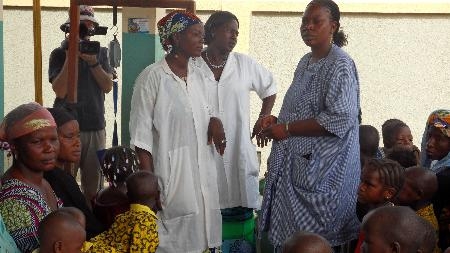DEReC Homepage
Most recent reports
Search by sector
Search by country
|
Focus: Crisis in Mali
Photo: Staff and patients at a community health centre in Mali (IOB, 2011)
Mali receives some $1 billion per year in official development assistance, 42% of it in the form of support to the national budget. Though it remains one of the poorest countries in the world, with 5% real economic growth and a democratically elected government, Mali has long been viewed as a relatively good performer in the region. A coup d'état and rebellion in the north earlier this year caused the government to collapse and fighting has forced tens of thousands to flee their homes (AlertNet). A number of recent evaluations examine the role of Mali's development partners in supporting governance, poverty reduction and growth in the country:
An evaluation of budget support in Mali found that assistance was an effective instrument for supporting progress in social sectors such as education and health, and supporting poverty reduction, where political will and government policy and capacity were in place. Where partners disagreed on priorities for reform, as was the case for decentralisation, budget support was unable to induce changes and progress was slow. The evaluation also points to weak investment in rural areas.
An evaluation of aid effectiveness efforts was carried out by an independent evaluation team working with Mali's Ministry of Economy and Finance. The review found that changes in donor behaviour, notably efforts to make aid less fragmented and more in-line with national priorities, have made a difference.
>>> Browse more evaluations of development co-operation activities in Mali |
|
*Please note that publications are hosted on this site through an agreement with the original authoring agencies, who retain all rights and privileges. For information on citation or reproduction of a report, please contact the author directly.
Link this page: www.oecd.org/dac/evaluationnetwork/derec



